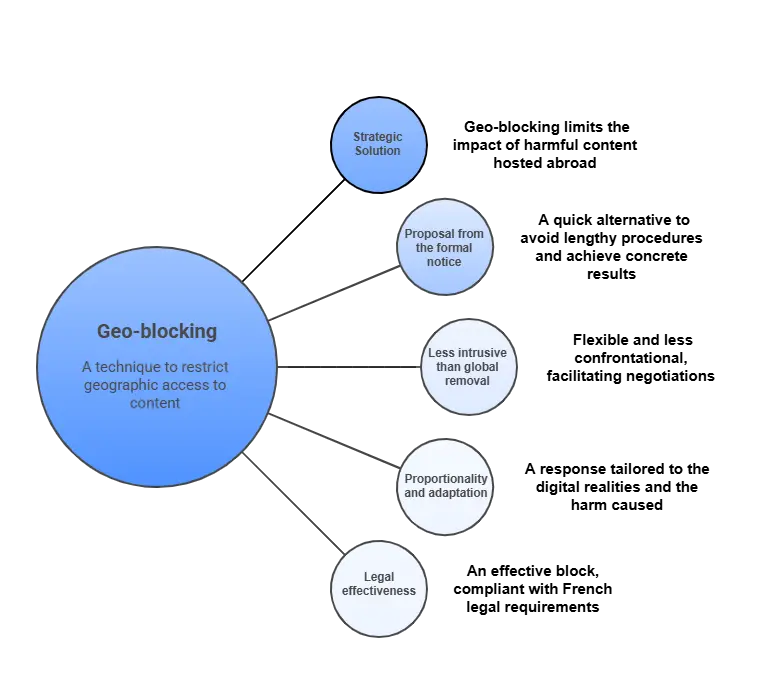Sommaire
Introduction
In today’s digital landscape, businesses and individuals often face defamatory or unlawful content that is disseminated online, frequently hosted abroad. While the global removal of such content can be complex, geo-blocking, which involves restricting access to content based on the user’s geographical location, has become an increasingly effective and adopted solution. In its ruling of June 13, 2025, the Paris Court of Appeal acknowledged that, under certain conditions, geo-blocking content from France can be considered a removal, thus fulfilling the legal requirements for content withdrawal. This legal development offers a way to balance the protection of individuals’ and businesses’ rights against online infringements, while addressing territorial concerns in a globalized digital environment
Definition of geo-blocking
1.1 What is geo-blocking ?
Geo-blocking is a technical measure used to restrict access to online content based on the user’s geographic location, typically identified through their IP address. It allows a website or specific page to be blocked for users connecting from a particular country. This mechanism is widely used in fields such as intellectual property rights, audiovisual broadcasting, or to comply with territorial regulatory obligations. Legally, it serves as a strategic tool to limit access locally without requiring the global removal of the content. Its use is becoming increasingly common in cases involving online defamation or reputational harm.
1.2 How is it used in digital litigation ?
Geo-blocking plays a critical role in resolving cross-border disputes involving unlawful online content. When content infringing protected interests under French law is hosted abroad, its removal can be legally or technically difficult. Geo-blocking allows access to be limited to users in France, thereby neutralizing the harmful effects within national borders. It offers a pragmatic alternative to full takedown, especially where international procedures are unrealistic. As a targeted risk mitigation measure, it is increasingly recognized by French courts as a legally sufficient response.
Geo-blocking recognized as a legal form of removal
2.1 The legal basis : Article 6-I-8 of the french LCEN
Article 6-I-8 of the French Law on Confidence in the Digital Economy (LCEN) requires hosting providers to promptly remove any manifestly unlawful content once notified. Long interpreted as requiring complete takedown, this obligation is now evolving toward a territorial approach. The central question is : Can content that is only inaccessible from France be considered “removed” under French law ? In a cross-border digital environment, the affirmative response given by the Paris Court of Appeal in June 2025 marks a major shift. It confirms that geo-blocking, if effective, can fulfill the legal requirement of removal.
2.2 The june 13, 2025 ruling : a jurisprudential turning point
In a case between Eoservices and the site Signal-arnaques.com, the Paris Court of Appeal ruled on June 13, 2025, that geo-blocking access to content from France qualifies as removal, provided it renders the content inaccessible to French users. The defamatory comments, initially removed then reposted, had been blocked through IP filtering. The Court found that effective inaccessibility within France was sufficient to stop the infringement, in accordance with the LCEN. This ruling marks a significant evolution, establishing a territorial interpretation of the legal removal obligation.
Legal requirements for effective geo-blocking
3.1 The harm must be localized in France
To be legally valid, geo-blocking must address harm that is specifically suffered within French territory. The infringing content must either be in French, target a French audience, or affect a business operating in France. The damage must be objectively demonstrable, such as reputational harm, customer loss, or misdirected traffic. If the harm is not clearly localized, geo-blocking alone will be insufficient. The claimant must document the territorial impact, which is essential for the measure to be legally acceptable.
3.2 The blocking must be technically reliable and effective
French case law requires that geo-blocking genuinely prevents access from France using ordinary means. If content remains easily accessible via VPNs or standard browsers, the measure may be deemed ineffective. Courts expect proof of technical reliability, such as bailiff reports or expert audits using multiple French IPs. The IP filtering must be strict, active, and verifiable, or the measure will not meet the standard for terminating an infringement under French law.
Practical implications for victims of defamatory content
4.1 An Effective Defensive Strategy in a Cross-border Context
- Strategic solution: Geo-blocking provides a way to limit the impact of defamatory content hosted abroad.
- Proposed from the pre-litigation stage: It offers an alternative to avoid burdensome legal procedures while achieving tangible results on French soil.
- Less intrusive than global takedown: This measure is more flexible and less confrontational, facilitating negotiations with the content publisher.
- Proportionality and adaptation: It fits into a proportionality framework, addressing the realities of the modern digital environment.
- Legal effectiveness: When technically implemented, it meets the requirements of French courts.
4.2 The heightened evidentiary burden for the claimant
To justify geo-blocking, the claimant must present a structured and comprehensive body of evidence. This includes proving the content is unlawful, establishing clear harm within France, and demonstrating that the blocking measure is technically operative. Bailiff reports and technical audits are often necessary. These evidentiary demands underscore the importance of working with an experienced legal counsel in IP and digital law. Proper documentation is critical to preempt challenges and secure legal recognition of the measure.
Conclusion and outlook
The ruling of June 13, 2025, confirms that geo-blocking content from France may be legally treated as removal, provided it effectively prevents access from national territory. This solution reconciles the territorial limits of French law, freedom of expression abroad, and the need to effectively protect corporate reputation.
It offers a powerful strategic tool for brands facing harmful online content hosted outside France, in a context where digital sovereignty is increasingly essential.
The Dreyfus Law Firm supports businesses in protecting their interests in the face of legal challenges arising from an ever-evolving digital landscape.
Nathalie Dreyfus, with the support of the entire Dreyfus team
FAQ
1. Do courts always recognize geo-blocking as equivalent to removal?
No. Geo-blocking is accepted only if it is effective, targeted, and addresses harm localized in France. It is not a valid substitute in cases of criminal or global infringement.
2. How can I prove that geo-blocking is operational?
You must provide evidence such as bailiff reports or technical audits showing the content is no longer accessible from French IP addresses.
3. Can I still request global removal of content?
Yes. Geo-blocking is an alternative or complementary measure, but full removal remains relevant, especially if the content damages your brand internationally.
4. Does geo-blocking work on social media platforms?
Partially. Some platforms allow geo-filtering, but effectiveness depends on platform policies and the nature of the content. A formal or judicial request may be needed.
5. Is this solution suitable for trademark infringement cases?
Yes. If unauthorized use of a trademark is hosted outside France, geo-blocking can limit commercial harm on the French market while broader enforcement is pursued.


